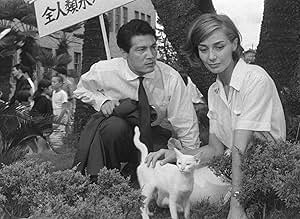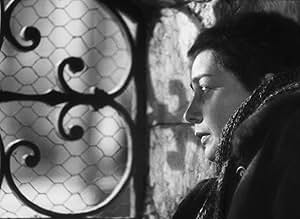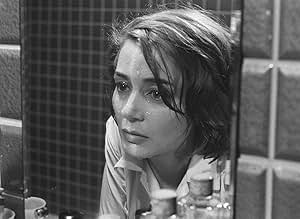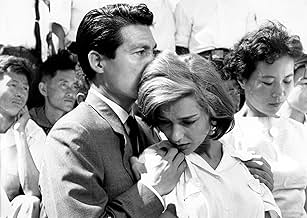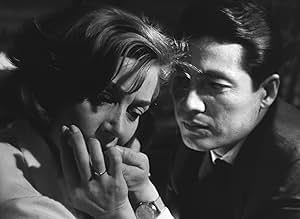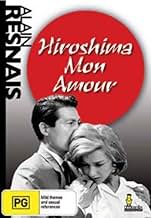ÉVALUATION IMDb
7,8/10
37 k
MA NOTE
Une actrice française qui tourne un film contre la guerre à Hiroshima a une aventure avec un architecte japonais marié au cours de laquelle ils échangent leurs points de vue différents sur l... Tout lireUne actrice française qui tourne un film contre la guerre à Hiroshima a une aventure avec un architecte japonais marié au cours de laquelle ils échangent leurs points de vue différents sur la guerre.Une actrice française qui tourne un film contre la guerre à Hiroshima a une aventure avec un architecte japonais marié au cours de laquelle ils échangent leurs points de vue différents sur la guerre.
- Nommé pour 1 oscar
- 7 victoires et 7 nominations au total
Histoire
Le saviez-vous
- AnecdotesThis film pioneered the use of jump cutting to and from a flashback, and of very brief flashbacks to suggest obtrusive memories.
- GaffesWhen Elle leaves the hotel to go the set, she is wearing a nurse's uniform with a headscarf and carrying a black handbag. When Lui meets her on the set, she is now wearing a skirt and blouse and still has the headscarf. When they leave the set, the headscarf is left behind. When they get to Lui's house, she now has a white jacket.
- ConnexionsEdited into Histoire(s) du cinéma: Le contrôle de l'univers (1999)
Commentaire en vedette
Hiroshima Mon Amour is brilliantly made and brilliantly acted, with a thoughtful, poetic script by the great French writer, Marguerite Duras. Its images are lyrical, disturbing, fascinating, and its anti-war message is profound and still frighteningly relevant. But in terms of strict entertainment...
Any film which begins with abstracted images of the entwined body parts of human lovers, slowly becoming encrusted with ash and (presumably) atomic fallout... and then spends an obscure 15 minutes arguing about the death and disfigurement of multitudes during the atomic bomb blast in Hiroshima, and the nature of memory and forgetfulness... well, you realize immediately that this movie isn't set up to go anyplace fun. Unless your idea of "fun" is witnessing someone else's graphic misery without the cleansing catharsis that accompanies a more conventional tragedy. Hey, some people enjoy that kind of thing! Not me, but to each his/her own.
Despite a structure which is famous for meandering through time, the film's narrative is fairly cogent and non-confusing, which is a plus. But the central illicit, inter-racial affair between a French actress and the Japanese architect whom she hooks up with during a film shoot in Hiroshima... It doesn't really make any sense. From the tiny acorn of a chance hookup, grows a mad-passionate love affair based almost entirely on memories dredged from the actress' past, which she disgorges to the architect, rather like a colorless Scheherezade, as she loses all rational connection to the present, conflating a youthful indiscretion with a deceased German soldier (and her subsequent descent into madness) with the non-happenings surrounding her current Japanese amour. German, Japanese... clearly, she can't tell these Axis races apart! I understand that the point of the film was not to create strict narrative coherence, but rather to delve into some kind of symbolic and psychic clash between this cold-yet-overwrought union of a French woman and her obsessed Japanese lover, and the horrors of War. But, despite some moments which are outright absurdist in effect, the overall tone of the film is grinding in its humorlessness. As I watched the characters fatalistically surrendering to their doom, all I could think was, "man, that Marguerite Duras must have been a drag to be romantically involved with." I mean, the Duras script, for all it's poetic symbolism and intellectual brilliance, etc etc, tells a story of people who are criminally passive and hopelessly clingy. Love seems to transform her characters into mere victims, of love, of war, of life, masochistically reveling in their own operatic suffering while doing virtually nothing. As the nameless SHE recalls her own suffering during her madness, scraping her fingertips off on the saltpeter-encrusted walls of her parent's cellar-prison, then receiving validation of existence by luxuriously sucking her own blood from her ravaged hands because otherwise she is utterly alone, all I could think was... Oh brother! This character is so badly damaged, how did she ever manage to get happily married before she embarked on this chance affair in Japan? The imagery is fabulous and intense, but are these really human beings that could have plausibly embarked on a journey together? One human being, actually, because the Japanese architect is little more than a handsome cipher of "love"... love, in this story, apparently meaning the obsession that arises from the act of physical copulation, an experience which is equated with destruction of the nuclear holocaust variety. So, Marguerite Duras clearly had issues surrounding her expression and experience of sexuality. And the film betrays little in the way of empathy, either, the characters are infused with an undercurrent of intense selfishness as they struggle to connect. HE is constantly delving into HER unhappy past even though it can give neither of them any pleasure or joy. The more HE delves, the more SHE becomes hopelessly entangled, and the more obsessed HE becomes... until the cold and bitter end.
At least in an opera, you get to revel in an outpouring of passion! In this bitter pill, everything is so cold and humorless... well, it really is difficult to understand why people wax enthusiastic over this film so much. There is much here to ADMIRE... but not much to love, in my opinion. Except intellectually, because the film is awash with symbolism and thought-provoking moments. As a viewing experience for the average intellectual, such as myself, however, I felt that once was enough. The time jumping and abstractions and other critically lauded elements of this movie have been done better and more entertainingly by others. Though this is the most emotionally powerful anti-nuclear statement I've ever seen, for which, as someone who had much of his family die in the Hiroshima nuclear blast, I am profoundly grateful.
Any film which begins with abstracted images of the entwined body parts of human lovers, slowly becoming encrusted with ash and (presumably) atomic fallout... and then spends an obscure 15 minutes arguing about the death and disfigurement of multitudes during the atomic bomb blast in Hiroshima, and the nature of memory and forgetfulness... well, you realize immediately that this movie isn't set up to go anyplace fun. Unless your idea of "fun" is witnessing someone else's graphic misery without the cleansing catharsis that accompanies a more conventional tragedy. Hey, some people enjoy that kind of thing! Not me, but to each his/her own.
Despite a structure which is famous for meandering through time, the film's narrative is fairly cogent and non-confusing, which is a plus. But the central illicit, inter-racial affair between a French actress and the Japanese architect whom she hooks up with during a film shoot in Hiroshima... It doesn't really make any sense. From the tiny acorn of a chance hookup, grows a mad-passionate love affair based almost entirely on memories dredged from the actress' past, which she disgorges to the architect, rather like a colorless Scheherezade, as she loses all rational connection to the present, conflating a youthful indiscretion with a deceased German soldier (and her subsequent descent into madness) with the non-happenings surrounding her current Japanese amour. German, Japanese... clearly, she can't tell these Axis races apart! I understand that the point of the film was not to create strict narrative coherence, but rather to delve into some kind of symbolic and psychic clash between this cold-yet-overwrought union of a French woman and her obsessed Japanese lover, and the horrors of War. But, despite some moments which are outright absurdist in effect, the overall tone of the film is grinding in its humorlessness. As I watched the characters fatalistically surrendering to their doom, all I could think was, "man, that Marguerite Duras must have been a drag to be romantically involved with." I mean, the Duras script, for all it's poetic symbolism and intellectual brilliance, etc etc, tells a story of people who are criminally passive and hopelessly clingy. Love seems to transform her characters into mere victims, of love, of war, of life, masochistically reveling in their own operatic suffering while doing virtually nothing. As the nameless SHE recalls her own suffering during her madness, scraping her fingertips off on the saltpeter-encrusted walls of her parent's cellar-prison, then receiving validation of existence by luxuriously sucking her own blood from her ravaged hands because otherwise she is utterly alone, all I could think was... Oh brother! This character is so badly damaged, how did she ever manage to get happily married before she embarked on this chance affair in Japan? The imagery is fabulous and intense, but are these really human beings that could have plausibly embarked on a journey together? One human being, actually, because the Japanese architect is little more than a handsome cipher of "love"... love, in this story, apparently meaning the obsession that arises from the act of physical copulation, an experience which is equated with destruction of the nuclear holocaust variety. So, Marguerite Duras clearly had issues surrounding her expression and experience of sexuality. And the film betrays little in the way of empathy, either, the characters are infused with an undercurrent of intense selfishness as they struggle to connect. HE is constantly delving into HER unhappy past even though it can give neither of them any pleasure or joy. The more HE delves, the more SHE becomes hopelessly entangled, and the more obsessed HE becomes... until the cold and bitter end.
At least in an opera, you get to revel in an outpouring of passion! In this bitter pill, everything is so cold and humorless... well, it really is difficult to understand why people wax enthusiastic over this film so much. There is much here to ADMIRE... but not much to love, in my opinion. Except intellectually, because the film is awash with symbolism and thought-provoking moments. As a viewing experience for the average intellectual, such as myself, however, I felt that once was enough. The time jumping and abstractions and other critically lauded elements of this movie have been done better and more entertainingly by others. Though this is the most emotionally powerful anti-nuclear statement I've ever seen, for which, as someone who had much of his family die in the Hiroshima nuclear blast, I am profoundly grateful.
- glofau
- 10 janv. 2016
- Lien permanent
Meilleurs choix
Connectez-vous pour évaluer et surveiller les recommandations personnalisées
- How long is Hiroshima Mon Amour?Propulsé par Alexa
Détails
- Date de sortie
- Pays d’origine
- Langues
- Aussi connu sous le nom de
- Hiroshima Mon Amour
- Lieux de tournage
- Nevers, Nièvre, France(street scenes, river banks)
- sociétés de production
- Consultez plus de crédits d'entreprise sur IMDbPro
Box-office
- Brut – États-Unis et Canada
- 96 439 $ US
- Fin de semaine d'ouverture – États-Unis et Canada
- 18 494 $ US
- 19 oct. 2014
- Brut – à l'échelle mondiale
- 139 947 $ US
- Durée1 heure 30 minutes
- Couleur
- Mixage
- Rapport de forme
- 1.37 : 1
Contribuer à cette page
Suggérer une modification ou ajouter du contenu manquant

Lacune principale
By what name was Hiroshima mon amour (1959) officially released in India in English?
Répondre


